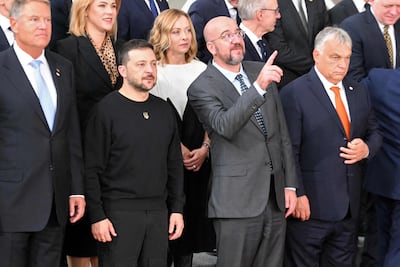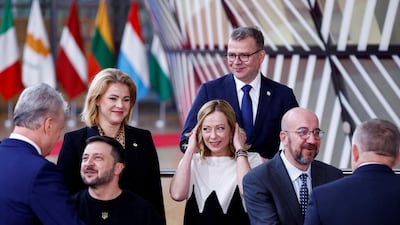Italian Prime Minister Giorgia Meloni urged EU leaders on Thursday to explore strategies to enable the return of Syrian refugees, as they discussed tightening migration rules at a summit in Brussels.
Ms Meloni, a far-right leader aiming to assert herself as a key player on migration and international affairs within the bloc, is set to travel to Jordan and Lebanon on Friday.
Italy has been pushing the EU to review its policy on Syria, driven by growing frustration over the unresolved Syrian civil war, which started in 2011 and has claimed more than 500,000 lives and displaced more than 12 million people.
The issue of Syrian refugees is closely linked to continuing discussions on migration due to the high number of Syrians who fled the civil war to live in Europe – with roughly one million in Germany alone.
This week, the European Commission signalled a shift in its approach, announcing plans to consider the creation of “return hubs” in non-EU countries for migrants who have no legal right to remain in Europe.
Ms Meloni held a separate meeting on Thursday with like-minded EU countries and Commission President Ursula von der Leyen to discuss Syria and broader migration issues. “What was mainly discussed today is that we have to see the elephant in the room: Syria,” a diplomat from one of the countries represented in the meeting told The National. “Syria is an issue that we have to address.”
The other countries present were Hungary, Cyprus, Greece, Austria, Malta, Poland, Slovakia, Denmark and the Netherlands. Ms Meloni's office said that the discussion focused on return hubs and on “the concept of safe third country” in view of the implementation of the bloc's migration and asylum pact.
Speaking ahead of the Brussels meeting, Ms Meloni told the Italian Senate: “It is necessary to review the European Union strategy for Syria and to work with all actors, to create the conditions for Syrian refugees to return to their homeland in a voluntary, safe and sustainable way.”
“We must invest in early recovery, so that refugees who decide to return find conditions that allow them to reintegrate into Syria,” added Ms Meloni. “In this regard, we support above all the efforts being made by the UNHCR, but we have also decided to strengthen our diplomatic presence in Damascus.”
Deals to stop arrivals
Ms Meloni had raised similar issues last week in Cyprus at a meeting of nine Mediterranean countries week with King Abdullah of Jordan, Ms von der Leyen, and Cypriot President Nikos Christodoulides.
Though most fighting in Syria has died down, more than 90 per cent of its population lives under the poverty line, and there is a dire lack of essential services including water and electricity.

The situation has been compounded by Israeli bombing which has pushed 400,000 people to flee Lebanon by land to Syria. Finding a solution to the Syrian refugee crisis is “even more pressing today” given regional developments, Italian sources said.
The latest UN Syrian refugee survey shows that only about one per cent of respondents said they intended to return to Syria in the next year. Returnees run the risk of being forcefully enrolled in the army or of being arbitrarily jailed.
Syrians living in Lebanon, where they are increasingly unwelcome, keep trying to get to Cyprus by boat. A deal struck in May by the EU with Lebanon to stop them from leaving has succeeded in almost stopping arrivals altogether. The EU has signed similar deals to keep migrants at bay in Tunisia, Egypt and Libya.

Italy is frustrated by the little progress made by Europe's policy towards Syria, Kelly Petillo, programme manager for the Middle East and North Africa at the European Council on Foreign Relations, told The National.
The bloc, which has cut diplomatic ties with Damascus, has as policy of three “nos” on Syria: no normalisation of relations, no reconstruction, no lifting of sanctions. Yet President Bashar Al Assad remains in power and has now normalised ties with the Arab League.
“Italy is saying: can we create some space to secure humanitarian gains on the ground?” said Ms Petillo.
Such efforts are closely linked to efforts to establish safe zones in Syria – a place where Syrians could be sent back to without fearing government persecution. Leaders meeting in Brussels on Thursday did not go into that level of detail, sources said.
Those who back such efforts say that they would work closely with UNHCR to ensure returns are safe, yet the UN agency has consistently maintained that no area in Syria is safe for return.
Sawsan Abu Zeinedin, chief executive at the Madaniya network, warned that Italy's work on Syria might backfire on Syrians.
“In leading the efforts of EU states to reconsider the EU strategy to Syria, Italy works to normalise the status quo in Syria under the guise of pragmatism,” Ms Abu Zeinedin told The National.
“Such actions risk undermining the political process, jeopardising peace and security, and worsening the refugee crisis. Refugees are increasingly becoming the targets of xenophobia, discrimination, and violent assaults as political discourse shifts toward rapprochement with Assad,” she said.
In May, eight EU countries, including Italy, met in Cyprus to reassess the situation of Syrian refugees. Cypriot Interior Minister Constantinos Ioannou had previously said that talks to establish safe zones in Syria were “gaining ground”.
The National revealed in June that Cyprus had accepted an offer by the Czech Republic to join a fact-finding mission on the ground in Syria to establish safe zones.
In July, eight EU nations, including Italy, asked the EU's external action service to “initiate a strategic discussion on Syria” to strengthen the “results-oriented delivery of our Syria policy”.
But Josep Borrell, head of the external action service, expressed little interest in the request. In an August 28 response, quoted by Politico, Mr Borrell wrote: “How the Syrian regime has been operating for decades is well known and documented, including with the direct support of both Russia and Iran.”
The push to encourage voluntary returns ignores the reality on the ground, which is that very few Syrians want to return to government-controlled areas, said Ms Petillo.
Most Syrians fleeing Israel's bombing of Lebanon by crossing back into Syria have told UNHCR that their intended destination was in the north-east, which is under Kurdish control, or the north-west, under Turkish control.
“The EU has a constant need to prioritise preventing migration, but reassessing its position on Syria couldn't come at a worse time,” said Ms Petillo.


